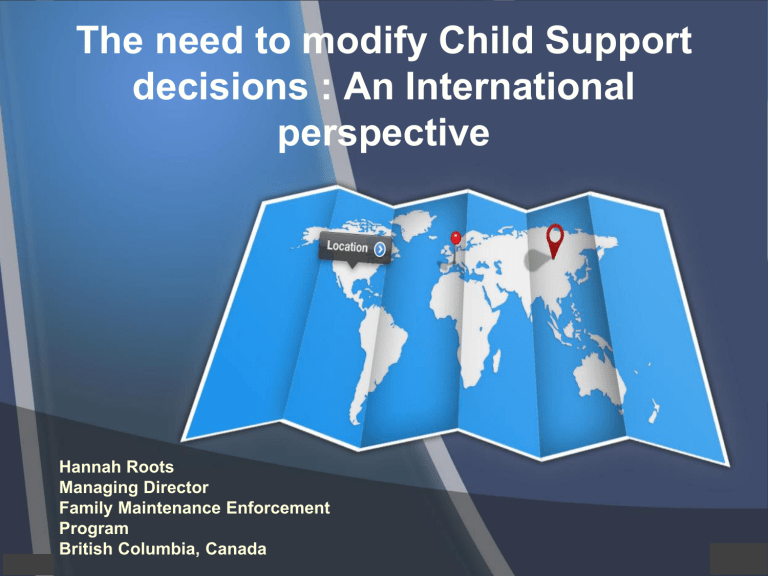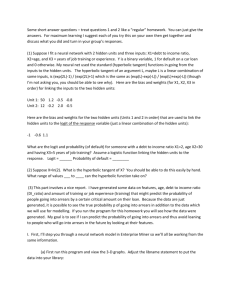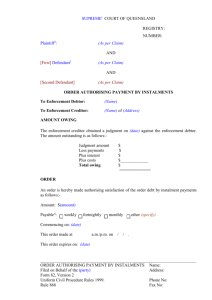Diapositiva 1 - from hcchasiapacificweek2015.org

The need to modify Child Support decisions : An International perspective
Hannah Roots
Managing Director
Family Maintenance Enforcement
Program
British Columbia, Canada
International Modifications
• Background
• Research
• Current modification model
• The child’s perspective
• Challenges and issues
• Options and best practices
• Next Steps
Why discuss modification?
• Family circumstances change; international cases are no different
• Recognition/Enforcement cases are majority of international cases
• Move to another country is significant change
• New circumstances are not always positive
• Payments cannot be made and arrears accrue
Reality - Modification is much more challenging on international cases
Modification and growth in arrears
• Research shows that when the amount of child support ordered exceeds 19 – 20 percent of the debtor’s monthly income, the probability of the debtor complying with the order drops significantly.*
• Once the case falls into arrears, and payments have to be made on the arrears as well as the regular amount , the total amount payable by the debtor will often exceed this threshold.
Key Research Finding – debtor doesn’t just pay less, the payments cease completely
* Takayesu , M.I., & Eldred, S.C. ( 2011 ). “How Do Child Support Orders Affect Payments and Compliance.” Orange
County Department of Child Support Services. Retrieved from http://www.css.ocgov.com/about/researchstudies
Arrears are a barrier to payment
• Other research* has shown that the existence of child support debt (arrears) can have serious consequences:
– Exacerbates conflict between the parents
– Deters debtors from taking work as they will be subject to wage garnishment
– Enforcement remedies such as licence suspension, liens against vehicles and incarceration reduce earning capacity
* Heinrich, C. J., Burkhardt, B. C., and Shager, H. M. (2010). Reducing Child Support Debt and its Consequences:
Can Forgiveness Benefit All? Institute for Research on Poverty, University of Wisconsin
–Madison. http://www.irp.wisc.edu/research/childsup/cspolicy/pdfs/2007- 09/FamiliesForward_3_19_10.pdf.
Arrears on International Cases
• Little published research on arrears on international cases
• Heidelberg Conference research
15,0%
10,0%
5,0%
0,0%
25,0%
British Columbia International
Cases (2015)
Percentage of International Caseload by Arrears
20,0%
Percentage of Caseload
Arrears Prevention
• Arrears prevention: Periodic modification to ensure that the maintenance aligns with debtor’s income and circumstances
• Successful programs include :
– Easy access to income information
– Administrative or government initiated modifications
• Purpose: ensure arrears do not grow to the level where the debtor ceases to make any payments
(ongoing or arrears)
Modification challenges
• Challenges in Court-based systems
– Self-represented litigants
– Complex Court processes
– Few resources for modification compared to resources for establishing child support
– Existence of arrears may preclude access to mediation or dispute resolution services
All of this is even more challenging on an international case
The child’s perspective
• Child’s right to an appropriate level of child support
• How would a creditor know about increases in the debtor’s income?
• Is there a practical mechanism for the creditor to request information?
• Who monitors debtor’s income?
• If the CA does have information about the debtor’s income – can this be shared with the creditor?
The (Court) Road to Modification
• Debtor commences application
• Limited (if any) assistance
• Right to modify can be very different in each country
– E.g. second families, voluntary unemployment, cancellation of arears
• Delays in transmission /service /setting hearing = arrears
• Creditor may be self-represented
• Role of Central Authority in receiving State in the
Court hearing is not clear to Court or parties
• No retroactive decision = arrears
Reality - Timely modification in order to prevent arrears from accruing is unlikely
Enforcement Context
• Enforcement -where theory meets reality
• Enforcement programs must enforce the existing order
• If the debtor cannot make the payments – compliance will decrease and enforcement is taken
• Enforcement / non-compliance cycle continues
• Even if debtor’s country does not have the legal jurisdiction to change the order – it can control enforcement
• Unhappy compromise– the only option is to go to Court to limit enforcement (without actually modifying the order)
The arrears conundrum
• Arrears prevention is very challenging on international cases
• Takes too long and is too complex for most debtors
• Cancellation of arrears through the two-State process is difficult and uncertain
• Assistance for debtors who are seeking to reduce payments or cancel arrears is not a high priority
• Equally challenging for creditors who seek increase
• Canadian perspective – Courts are frustrated with the cumbersome process
Some best practices ?
• Maintenance decisions that contemplate a regular review and modification
(Australia/New Zealand)
• Recalculation programs have potential
Next Steps
• Collect best practices concerning timely modification on international cases
• Define any limitations on sharing income information on a regular basis to support modification
• Continue research to better understand the nature of arrears on international cases
Thank You!
Hannah Roots hroots@fmep.ag.gov.bc.ca





